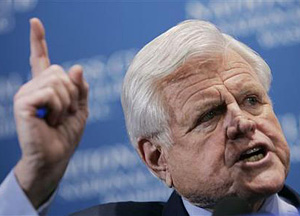 |
 |
 |
 News from Around the Americas | January 2007 News from Around the Americas | January 2007  
Bush Allies Warn Iraq Vote Could Harm War Plan, GOP Future
 Jim VandeHei - Politico.com Jim VandeHei - Politico.com


| | Sen. Edward Kennedy, D-Mass., gestures as he answers a question following his speech at the National Press Club in Washington Tuesday, Jan. 9, 2007. (AP/Pablo Martinez Monsivais) |
Top White House officials are scrambling to prevent a showdown over the Iraq war that could tear apart the Republican Party and severely undermine President Bush's plan to increase U.S. troop levels.

A top GOP staffer says more than 70 senators would oppose the surge if their vote matched their comments in private meetings. "The White House is trying to but they really don't know how to handle this," said a senior GOP aide involved in the talks.

White House officials are pleading with GOP senators to oppose any congressional resolution that specifically condemns Bush's effort to escalate the war effort in coming months, congressional sources said Friday morning. In private conversations, the officials are telling senators that the resolution would demoralize U.S. troops and hurt the GOP politically for years to come.

Bush allies are arguing that Republicans will damage their individual political interests as well. Their logic is that there is no anti-war constituency inside the Republican Party, pointing specifically to Sen. Chuck Hagel, R-Neb., a potential presidential candidate who has opposed the surge but not gained much traction with party activists. "That's a flat argument," the senior aide said. "That does not work."

On a more substantive level, White House officials are arguing that U.S. commanders are confident the escalation will work, but only if Iraqis and world leaders understand the plan has congressional backing. The White House has sent signals that it would stomach a resolution establishing firm deadlines and accountability requirements as long as it does not outright condemn the surge, congressional sources said.

The debate playing out over next few weeks promises to be the most contentious and politically charged debates over the Iraq war since the original vote authorizing the invasion more than four years ago.

Both parties are scrambling to strike a unified position on congressional resolutions condemning the Bush plan to escalate the war. But behind the scenes Republicans and Democrats alike are split over the smartest approach for managing a so-far unsuccessful and unpopular war without alienating voters.

The debate is most wrenching for Republicans. Resolutions are nonbinding (therefore meaningless on a substantive level) but some GOP leaders fear a bipartisan repudiation of the Bush policy would be a precursor to more dramatic steps.

GOP Sen. John Cornyn, a conservative from Texas, has been circulating a resolution endorsing the surge of more than 20,000 U.S. troops. Few Republicans are enthusiastic about the idea.

Sen. George Voinovich, R-Ohio is a surge skeptic who this week opposed a Democratic resolution in the Foreign Relations Committee harshly condemning the military build-up, is among a group of Republicans seeking a middle ground. In a series of private meetings over the past few days, Voinovich and other Republicans have discussed a resolution that would set firm benchmarks for success and stop short of rebuffing Bush altogether. House Republican leaders are pushing a similar approach, which would amount to brush-back pitch.

The Bush White House is described as panicked by the prospects of mass defections and open to compromise. They have cause for concern: at least six Republicans, including Sen. John Warner of Virginia, have signed resolutions opposing the surge. Senate Majority Leader Harry Reid, Nev., has not committed to a vote on the resolution next week. He is negotiating compromise language between Foreign Relations Chairman Joseph Biden, D-Del., and Warner, the panel's ranking Republican and an influential voice on military matters, to entice more GOP senators to support the measure.

On the House side, the White House has continued inviting rank-and-file Republicans, particularly freshmen, to meet with Bush and other administration officials, a GOP leadership aide said. House Minority Whip Roy Blunt, R-Mo., has not whipped previous war resolutions and said he is not inclined to enforce party discipline on this vote either.

Blunt's number two, Rep. Eric Cantor, R-Va., has been meeting informally with members to build support for the resolution he offered with Rep. Sam Johnson, R-Texas, to prevent any funding cuts for troops already on the ground.

Democrats are more unified - at least in public. House Speaker Nancy Pelosi has pulled several antiwar members aside and pleaded with them not to call for cutting off funding for U.S. troops to stop the war. Her efforts have caused friction inside the Democratic Party, because lawmakers and many activists argue it is hypocritical for leaders to call the war immoral and not doing everything in its power to stop it.

Ways and Means Chairman Charles Rangel, a liberal from New York, said his firm belief that the Iraq war is a disgrace and not in the best interest of the United States. Yet, "I can not even conceive of the Congress substituting its legislative power for the executive commander in chief authority," Rangel said in a recent interview. "What you do is what you are supposed to do: oversight of" the Bush White House.

Pelosi's response has been clear: cutting off funding would be wrong and politically damaging to a Democratic Party trying to strike a more centrist tone. Still, some Democrats said pressure is mounting for leaders to consider more dramatic steps to prevent an escalation.

Sen. Russ Feingold, an antiwar Democrat from Wisconsin, will put pressure on his party leaders to consider more drastic measures on the eve of the vote. Feingold has scheduled a hearing for next week to explore whether Congress has the authority to cut off funds for the military campaign. | 
 | |
 |



